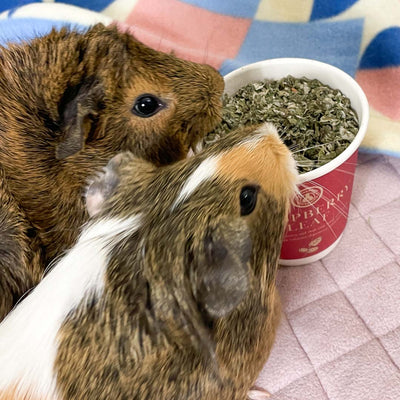Key Takeaways
- Personality Traits: Male guinea pigs are typically more social and affectionate, whereas females often exhibit a greater sense of independence.
- Space Needs: Males usually require more space due to their territorial nature.
- Health Factors: Female guinea pigs may be at a higher risk for specific health concerns, such as ovarian cysts, in comparison to males.
- Behavioral Interactions: When housed together, males may show more dominance, while females are likely to develop stronger bonds with one another.
Like most mammals, female and male guinea pigs have natural differences. Both can make amazing companions when cared for properly, but the different influences by their sex can still be impactful. Understanding the differences between male and female guinea pigs is important, especially since procedures to remove the sexual organs of guinea pigs are less common than they are for cats and dogs.
Understanding your guinea pigs' hormonally influenced behaviors can have a significant impact on their quality of life, so here is everything you need to know about the distinct differences between guinea pigs, male and female.

How to Tell a Male Guinea Pig From a Female
From above, male and female guinea pigs have no notable sexually dimorphic traits. On average, male guinea pigs tend to be slightly larger than their female counterparts, but a few ounces difference in weight is not a conclusive measure of sex. To properly determine the sex of a guinea pig, their reproductive organs have to be assessed.
You may be wondering if there are any special names that each of the sexes are called, and the answer is yes! Even the babies are called something special. What are female guinea pigs called? They’re called sows! And what are male guinea pigs called? They’re called boars, and baby guinea pigs are called pups! Calling them by these names can actually be easier when referring to one or the other.

Guinea pigs are compact animals that develop with age and dislike being flipped over. These factors make it difficult to judge a guinea pig’s sex, especially in young or long-haired animals. It is easiest to determine the sex of an adult intact short-haired male guinea pig, as their testicles are generally visible behind their rear legs. If these two distinct oval protrusions are not visible, the guinea pig will have to be held up or flipped over to be assessed.

Be very gentle with guinea pigs while doing this, and know what you are looking for ahead of time to minimize how long they have to stay still. A female guinea pig will have a genital area that resembles a “Y” shape while males have more of an “i” shape. The dot on the “i” is the penis, and you can confirm your guinea pig is male by applying slight pressure above the genitals. If the dot sticks out further, you can be fairly confident you have a male.
Guinea Pig Social Differences
One of the main reasons why it is important to positively identify the gender of guinea pigs is to provide them with a suitable social group. Guinea pigs are very social, but their companion preferences are influenced by their sex, and so are their chances of having babies.
People often ask things like why are my female guinea pigs fighting—In the wild, guinea pigs have complex social structures, and you may be surprised to find that all-female groups are unlikely. Female-only groups tend to lead to conflicts and generally require at least one male to maintain a proper social structure. It has also been found that female guinea pigs prefer a male bonding partner, and this partnership can reduce stress levels for both individuals.
Although female only groups bicker a lot, they tend to have less fallouts and fights than all male groups. Male guinea pigs tend to be more territorial. Always be sure to provide enough space and hideys in their cage to prevent guinea pig fights from occurring regardless of sex.

One question that is often asked is do female guinea pigs go into heat, and the answer is yes. The challenge then becomes preventing unwanted breeding, which is often done by neutering the male. A neutered male has less testosterone. This is important because it reduces their chances of displaying territorial, dominant, or female guarding behavior with other males.
Although this builds a social structure, neutering guinea pigs can be very dangerous. If a guinea pig parent prefers to have both male and female guinea pigs, we always recommend they be separated in different guinea pig cages.
Influences on Personality
The personality of a guinea pig when it interacts with people is dependent on a number of factors, sex included. That being said, it’s not as simple as asking things like are female guinea pigs friendly, or are male guinea pigs friendly?
When hormones are considered, male guinea pigs are expected to be the less skittish sex, especially if they are not neutered. Heightened testosterone levels are known to make most mammals seem more extraverted as they seek to dominate or stand their ground in social situations.

This does not mean that every male guinea pig will be naturally outgoing and every female will be timid. Personality is influenced by genetics outside of sex hormones and life experiences from a young age, so it is best to learn your guinea pig’s personality by spending time with them and bonding with them. If you socialize any guinea pig properly and carefully desensitize them to human interactions, they can be a loveable companion.
Diet and Health Differences
Male and female guinea pigs can share food supplies since they require the same nutrients in quantities that are more influenced by their body weight than their sex. There is, however, one major exception.
If a female guinea pig, often called a sow, gives birth to exceptionally large offspring or a litter of more than four she could be at risk of pregnancy toxemia. This condition consists of low blood calcium levels and high blood pressure from milk production and giving birth.
This is significant to dietary differences because providing pregnant female guinea pigs with a calcium-rich diet can help prevent this condition. We always encourage dietary supplements like GuineaDad Raspberry Leaf. Raspberry leaves are very beneficial for pregnant guinea pigs, or guinea pigs that have recently given birth.


If the guinea pig bedding is not cleaned properly, it can bring health concerns for both sexes. Female guinea pigs are more likely to develop urinary tract infections than male guinea pigs.
This is why we encourage you to have convenient and healthy guinea pig bedding like GuineaDad Liners, intentionally developed to prevent bacterial infections. While on the other hand, male guinea pigs are more likely to develop impaction. Impaction can be seen in after 2-3 years of age and occurs there is a build up of fecal matter in the rectal area.
Which Guinea Pig is Best for You?
Female and male guinea pigs are very similar in their appearances, have a variety of personalities, and studies have even shown them to have similar levels of skin sensitivity. In short, the sex of a guinea pig is most important when determining social structures within a group and for managing breeding activity. With those main points in mind, all guinea pigs can be great pets regardless of their sex.
Want to learn more about guinea pigs? Read our other guinea pig blogs:
Why Does My Guinea Pig Stare at Me?


































6 comments
Why don’t my daughters Guinea pig let us pick him up we have had him since June